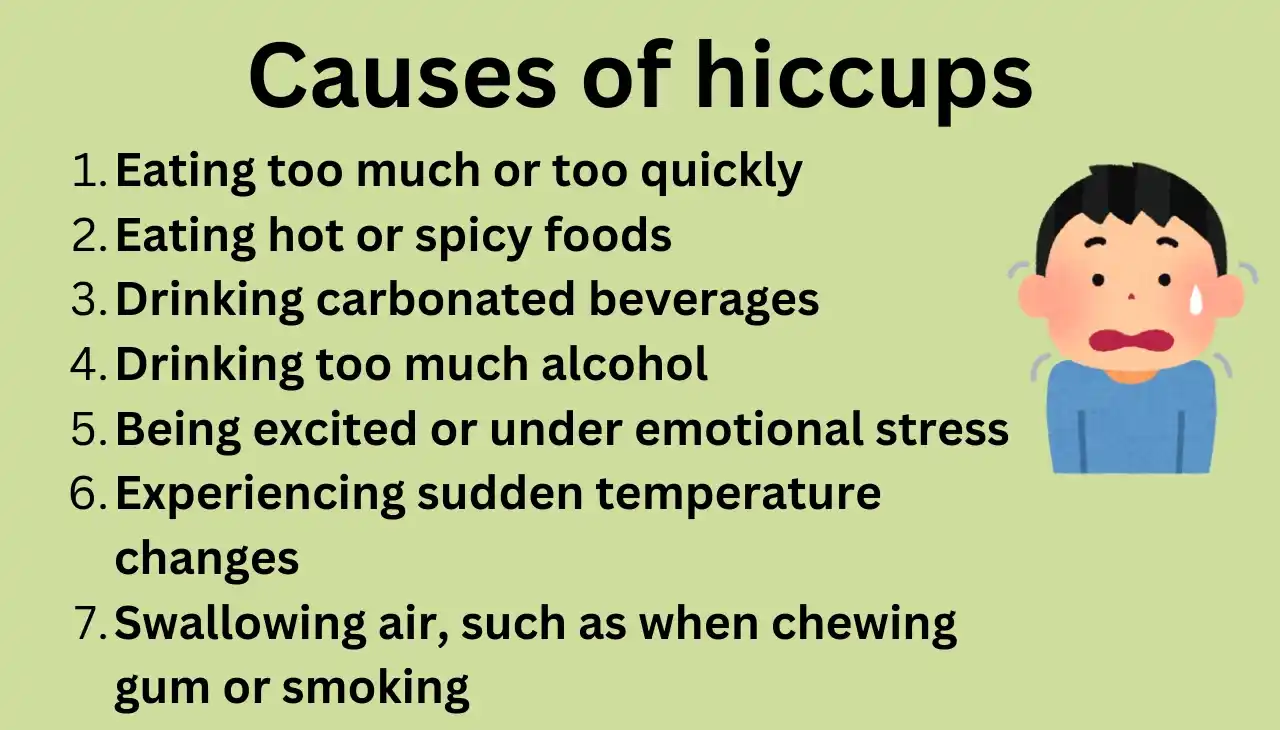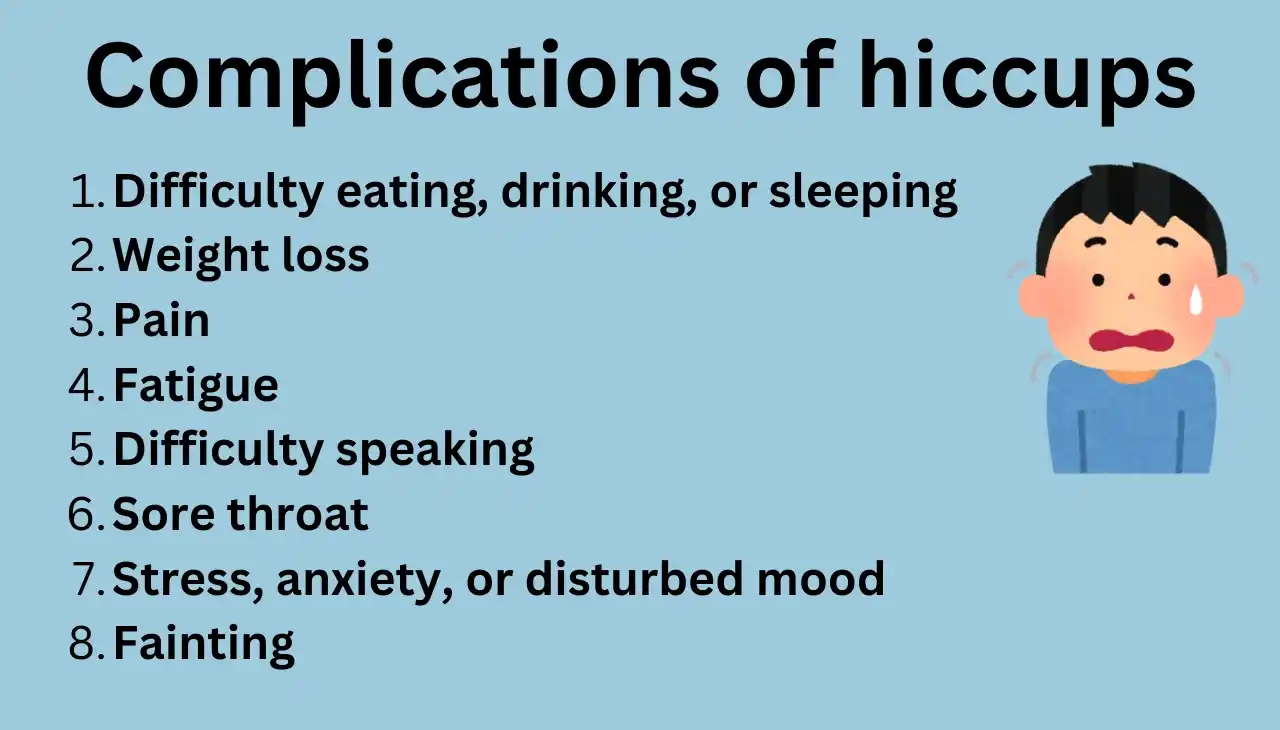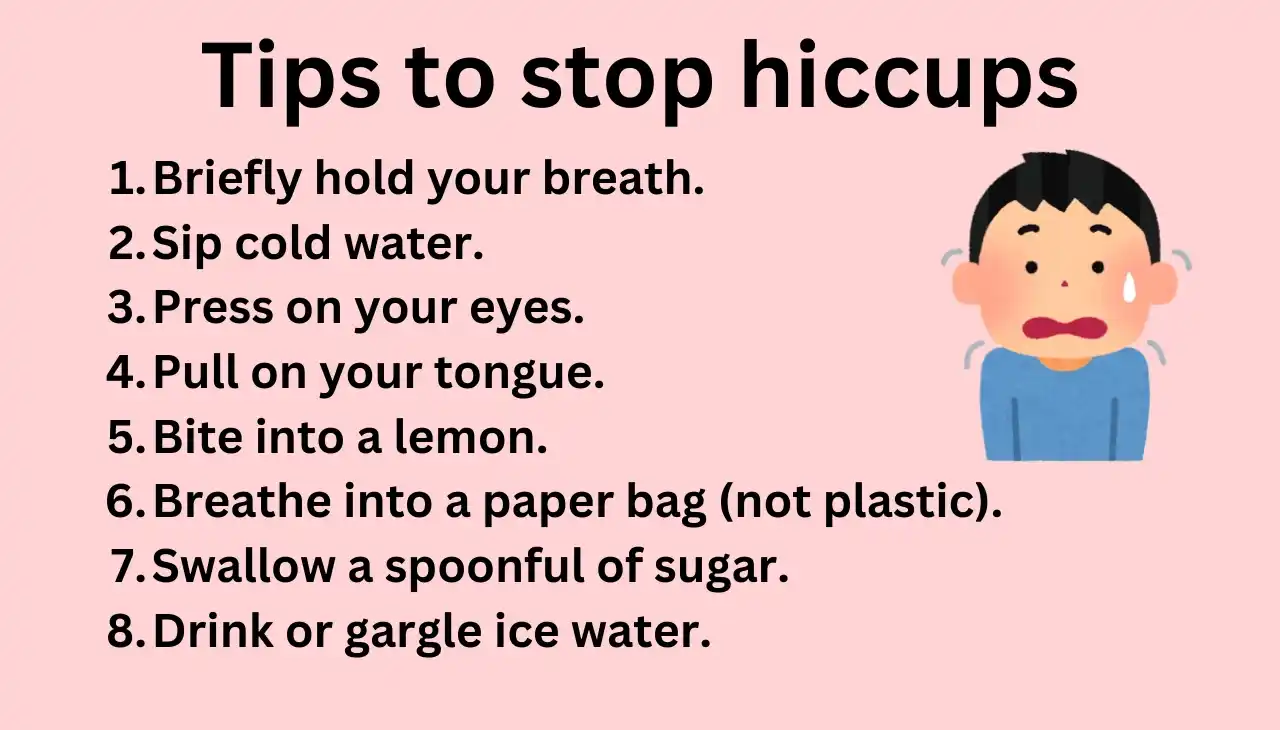Introduction
Ever been in the middle of an important conversation when suddenly you’re interrupted by an uncontrollable “hic”? We’ve all been there, desperately searching for ways to stop your hiccups fast. This article delves into the world of hiccups, a common interruption in conversations. Hiccups are involuntary contractions of the diaphragm, often caused by stress or anxiety. Although usually harmless, they can be annoying and embarrassing. The article explores the causes, methods to stop them quickly, and when to worry about them.
What are hiccups
Hiccups are involuntary contractions of the diaphragm, the muscle that separates your chest from your abdomen and plays a crucial role in breathing. When the diaphragm contracts suddenly, it causes the vocal cords to close briefly, producing the characteristic “hic” sound.
How Hiccups Work
The diaphragm normally pulls down when you inhale to let air into your lungs and relaxes when you exhale to release air. When something irritates the diaphragm, it can spasm, causing you to suddenly suck air into your throat. This air hits your voice box, causing your vocal cords to close suddenly and create the “hic” sound.
Most hiccups are harmless and go away on their own within a few minutes. However, if they persist for more than 48 hours, it’s a good idea to consult a healthcare professional.
The Hiccup Mechanism: A Three-Step Process
Here’s where things get interesting. A hiccup isn’t just a single event; it’s a three-step process:
- Diaphragm Spasm: First, your diaphragm contracts suddenly and involuntarily. This is the “hic” part of the hiccup.
- Quick Inhalation: This contraction causes you to take a quick breath in, which is cut short by the next step.
- Vocal Cord Closure: Almost immediately after the inhalation begins, your vocal cords snap shut. This is what creates the characteristic “up” sound of a hiccup.
This whole process happens in a fraction of a second, and then repeats… and repeats… and repeats. No wonder hiccups can be so frustrating!
What causes hiccups
Hiccups are produced by involuntary spasms of the diaphragm, a muscle that divides your chest and belly and plays an important role in breathing. When the diaphragm contracts suddenly, it causes the vocal cords to close briefly, producing the characteristic “hic” sound.
Common Causes of Hiccups
- Eating and Drinking Habits:
- Eating too quickly or too much
- Consuming spicy or very hot/cold foods
- Drinking carbonated beverages or alcohol
- Swallowing Air:
- Chewing gum
- Sucking on candy
- Drinking through a straw
- Emotional Triggers:
- Sudden excitement
- Stress or anxiety
- Environmental Factors:
- Sudden changes in temperature
- Drinking very hot or cold beverages
- Medical Conditions:
- Gastroesophageal reflux disease (GERD)
- Irritation of the diaphragm
- Certain medications
Most hiccups are harmless and go away on their own within a few minutes. However, if they persist for more than 48 hours, it might be a good idea to consult a healthcare professional.

Stop hiccups in adults immediately
Hiccups can be quite annoying, but there are several methods you can try to stop them immediately:
Breathing and Posture Techniques
- Hold Your Breath: Take a deep breath and hold it for about 10-20 seconds, then exhale slowly. Repeat if necessary.
- Breathe into a Paper Bag: Place a paper bag over your mouth and nose, and breathe in and out slowly. Be careful not to use a plastic bag.
- Hug Your Knees: Sit down, bring your knees to your chest, and lean forward to compress your diaphragm.
- Valsalva Maneuver: Try to exhale forcefully while pinching your nose and keeping your mouth closed.
Pressure Points
- Pull on Your Tongue: Gently pull your tongue forward to stimulate the nerves and muscles in your throat.
- Squeeze Your Nose: Pinch your nose while swallowing water.
- Massage Your Carotid Artery: Gently massage the artery on both sides of your neck.
Other Methods
- Drink a Glass of Water Quickly: This can help reset your diaphragm.
- Swallow a Teaspoon of Sugar: The graininess of the sugar can stimulate the vagus nerve.
- Gargle with Water: This can help interrupt the hiccup cycle.
If your hiccups persist for more than 48 hours or are severe enough to interfere with eating, breathing, or sleeping, it’s best to consult a doctor.
Stop hiccups instantly at home
Stopping hiccups instantly at home can be achieved with a few simple techniques. Here are some effective methods:
Breathing and Posture Techniques
- Hold Your Breath: Take a deep breath and hold it for about 10-20 seconds, then exhale slowly. Repeat if necessary.
- Breathe into a Paper Bag: Place a paper bag over your mouth and nose, and breathe in and out slowly. Be careful not to use a plastic bag.
- Hug Your Knees: Sit down, bring your knees to your chest, and lean forward to compress your diaphragm.
- Valsalva Maneuver: Try to exhale forcefully while pinching your nose and keeping your mouth closed.
Pressure Points
- Pull on Your Tongue: Gently pull your tongue forward to stimulate the nerves and muscles in your throat.
- Squeeze Your Nose: Pinch your nose while swallowing water.
- Massage Your Carotid Artery: Gently massage the artery on both sides of your neck.
Other Methods
- Drink a Glass of Water Quickly: This can help reset your diaphragm.
- Swallow a Teaspoon of Sugar: The graininess of the sugar can stimulate the vagus nerve.
- Gargle with Water: This can help interrupt the hiccup cycle.
These methods are backed by anecdotal evidence and can be quite effective.

How do you get rid of hiccups in 10 seconds
Getting rid of hiccups in 10 seconds can be challenging, but here are a few quick methods you can try:
Quick Techniques
- Hold Your Breath: Take a deep breath and hold it for as long as you can, then exhale slowly. This can help reset your diaphragm.
- Swallow Sugar: Swallowing a teaspoon of sugar can stimulate the vagus nerve and stop hiccups.
- Sip Ice-Cold Water: Quickly drink a glass of ice-cold water. The cold can help interrupt the hiccup cycle.
- Pull on Your Tongue: Gently pull your tongue forward to stimulate the nerves and muscles in your throat.
These methods are quick and often effective. If your hiccups persist, you might need to try a combination of techniques or consult a healthcare professional.
How to stop hiccups of a newborn
Newborn hiccups are quite common and usually harmless.
Techniques to Stop Newborn Hiccups
- Burp Your Baby: Burping your baby during and after feedings can help release any trapped air that might be causing hiccups.
- Change Feeding Positions: Try feeding your baby in a more upright position to reduce the amount of air swallowed.
- Use a Pacifier: Sucking on a pacifier can assist to relax the diaphragm and prevent hiccups.
- Gripe Water: Some parents find that giving gripe water, an over-the-counter herbal supplement, can help ease hiccups.
- Wait It Out: Often, the best approach is to simply wait for the hiccups to pass on their own.
Preventive Tips
- Feed Smaller Amounts More Frequently: This can help prevent your baby from swallowing too much air.
- Take Breaks During Feeding: Pause to burp your baby every few minutes during feeding.
- Ensure Proper Latch: If breastfeeding, make sure your baby is latched on correctly to minimize air intake.
If your baby’s hiccups are frequent or seem to cause discomfort, it’s a good idea to consult your pediatrician to rule out any underlying issues like gastroesophageal reflux (GERD).
Stop hiccups without water
Stopping hiccups without using water is definitely possible. Here are some effective methods:
Breathing and Posture Techniques
- Hold Your Breath: Take a deep breath and hold it for about 10-20 seconds, then exhale slowly. Repeat if necessary.
- Breathe into a Paper Bag: Place a paper bag over your mouth and nose, and breathe in and out slowly. Be careful not to use a plastic bag.
- Hug Your Knees: Sit down, bring your knees to your chest, and lean forward to compress your diaphragm.
- Valsalva Maneuver: Try to exhale forcefully while pinching your nose and keeping your mouth closed.
Pressure Points
- Pull on Your Tongue: Gently pull your tongue forward to stimulate the nerves and muscles in your throat.
- Squeeze Your Nose: Pinch your nose while swallowing.
- Massage Your Carotid Artery: Gently massage the artery on both sides of your neck.
Other Methods
- Swallow a Teaspoon of Sugar: The graininess of the sugar can stimulate the vagus nerve.
- Bite on a Lemon: The sour taste can help interrupt the hiccup cycle.
- Plug Your Ears: This can create pressure changes that stimulate the vagus nerve.
These methods are often effective and can help you get rid of hiccups quickly. If your hiccups persist, you might need to try a combination of techniques or consult a healthcare professional.

Why you can’t stop hiccuping
Persistent hiccups can be frustrating and may indicate an underlying issue. Here are some common reasons why hiccups might not stop:
Possible Causes of Persistent Hiccups
- Nerve Irritation or Damage:
- Irritation of the vagus or phrenic nerves, which control the diaphragm, can cause prolonged hiccups. This can be due to conditions like gastroesophageal reflux disease (GERD) or even a sore throat.
- Central Nervous System Disorders:
- Disorders affecting the brain or spinal cord, such as multiple sclerosis, stroke, or traumatic brain injury, can lead to persistent hiccups.
- Metabolic Disorders:
- Conditions like diabetes or electrolyte imbalances can trigger long-lasting hiccups.
- Medications:
- Certain medications, including steroids and some types of anesthesia, can cause hiccups as a side effect.
- Other Medical Conditions:
- Persistent hiccups can also be associated with conditions like kidney failure, infections, or even tumors affecting the diaphragm.
When to See a Doctor
If your hiccups last more than 48 hours or are accompanied by other symptoms like chest pain, difficulty breathing, or severe discomfort, it’s important to seek medical attention. A healthcare practitioner can assist in determining the underlying reason and recommending the most effective therapy.
Have you noticed any specific triggers or patterns with your hiccups? This information might help in identifying the cause.
Tips to stop your hiccups
Common Causes of Hiccups
Everyday Triggers:
- Eating Too Quickly: Excess air from fast food can cause hiccups.
- Carbonated Beverages: The rapid expansion of the stomach can irritate the diaphragm.
- Spicy Foods: The phrenic nerve, controlling the diaphragm, can be irritated by spicy foods.
- Stress or Excitement: Strong emotions can trigger hiccups during nerve-wracking presentations or exciting events.
Medical Conditions:
- Gastroesophageal Reflux Disease (GERD): This condition can irritate the diaphragm and lead to hiccups.
- Peptic Ulcers: Painful sores in the stomach or small intestine can cause hiccups due to inflammation and irritation.
- Pancreatitis: Pancreas inflammation can irritate the surrounding area.
- Hepatitis: In some cases, liver inflammation can lead to hiccups due to the liver’s proximity to the diaphragm.
Note: While hiccups are usually temporary, persistent symptoms should be checked with a doctor.
Remedies for Hiccups
Breathing Techniques
- Slow, Controlled Breathing: Taking a deep, slow breath in through the nose and holding it for about 5 seconds.
- Breath-Holding: Counting to 10 and exhaling slowly to increase carbon dioxide levels in the blood.
- Paper Bag Breathing: Breathing into a paper bag for a few breaths and then breathing normally.
- Valsalva Maneuver: Taking a deep breath, closing the mouth, pinching the nose shut, exhaling forcefully, and holding for 10-15 seconds, then releasing.
Gargling and Sipping Water
- Gargling with Water: Filling a glass with cold water and taking a mouthful and tilting the head back. Gargle for about 30 seconds.
- Sipping Water: Taking small, quick sips of water and swallowing each sip without breathing between.
- Distracting the diaphragm from hiccuping.
Ingesting Substances
- Sugar, Sugar, Lemon, Please!: Using a teaspoon of granulated sugar on the tongue and swallowing the sugar water.
- Lemon, Please!: Using a fresh lemon wedge and sucking on the juice.
- Vinegar Shot: Taking a small shot of vinegar and swallowing it quickly.
Other Home Remedies
- The Ice Cube Trick: Holding an ice cube on the back of your neck for about 30 seconds.
- Smelling Salts: Opening smelling salts and taking a quick sniff.
- The Tongue Pull: Sticking out your tongue and gently pulling on it.
Note: What works for one person might not work for another. Try different methods or combine a few.

Seeking Medical Attention for Chronic Hiccups
Understanding Chronic Hiccups
- Chronic hiccups are characterized by hiccups lasting over 48 hours or recurring frequently over a long period.
- They can be a sign of underlying medical conditions such as Gastroesophageal Reflux Disease (GERD), tumors, stroke, Multiple Sclerosis, and certain infections.
Signs of Chronic Hiccups Needing Medical Attention
- Did you know that hiccups can last for more than 48 hours?
- They can disrupt your ability to eat, sleep, or even breathe freely.
- Other symptoms like fever, headache, or difficulty swallowing are also present.
- Hiccups started after a medical procedure or new medication.
Treatment Options for Chronic Hiccups
- Doctors can prescribe medications like muscle relaxants, anti-nausea drugs, or certain psychiatric medications.
- In some cases, injections may be used to block the phrenic nerve.
- In extreme cases, surgery might be considered to disable the phrenic nerve.
Hiccups in Newborns: Causes and Treatment
- Hiccups are common in newborns and infants due to their developing digestive systems.
- Babies often swallow air while feeding, especially from a bottle, which can trigger hiccups.
- Overfeeding can cause the diaphragm to spasm, leading to hiccups.
- Temporary changes in temperature can also trigger hiccups.
- Hiccups are usually harmless to babies, and some can sleep through a bout of hiccups.
- If hiccups are frequent and cause distress, consult a pediatrician.
- Treatment and prevention methods include taking feeding breaks, checking the bottle, and feeding in an upright position.
- After feeding, burping can help release trapped air and keep the baby upright.
- If hiccups start, offer a pacifier, gentle back rubs, or gripe water, but consult a pediatrician before using any supplements.
- It’s important to remain calm and understanding, as every baby is different.

Conclusion: Mastering the Art of Hiccup-Stopping
This text provides an overview of hiccups, a common and complex condition involving a coordinated dance of muscles, including the diaphragm and vocal cords. The causes of hiccups can vary, from eating too quickly to underlying medical conditions. There are numerous remedies available, including breathing techniques and ingesting various substances. Chronic hiccups can indicate more serious issues, so it’s important to seek medical attention if they persist or cause distress.
Baby hiccups are usually normal, but parents should consult their pediatrician if they experience frequent hiccups. The text encourages approaching hiccups with curiosity and humor, as they can be annoying but also a reminder of the complexity of our bodies. Trying out different remedies can lead to entertaining moments, such as a grandfather trying to drink water from the far side of a glass to cure his hiccups.
In the future, hiccups can be managed with various methods, such as holding your breath, tongue-pulling, or vinegar shots. It’s important to remember that hiccups will pass, and if all else fails, it’s okay to continue hiccup-hunting.
FAQ:
Can hiccups be a sign of something serious?
While hiccups are usually harmless and short-lived, persistent or chronic hiccups can sometimes be a sign of an underlying medical condition. Hiccups that last more than 48 hours or occur frequently over a long period might indicate issues such as GERD, tumors, or neurological disorders. If you're experiencing prolonged hiccups, it's best to consult with a healthcare professional. They can rule out any serious conditions and provide appropriate treatment if necessary.
Are there any foods or beverages that might cause hiccups?
Certain foods and drinks can increase the risk of hiccups, such as carbonated beverages, spicy foods, extreme temperatures, alcohol, and large meals. These can cause the stomach to expand rapidly, irritate the phrenic nerve, and cause hiccups. To reduce the risk, it's recommended to eat and drink slowly, avoid extreme temperatures, and moderate the intake of spicy foods and carbonated drinks.
Can stress or emotions cause hiccups?
Absolutely! Stress, excitement, anxiety, and other strong emotions can indeed trigger hiccups. This is because emotional states can affect your breathing patterns and potentially lead to diaphragm spasms. Additionally, when we're stressed or excited, we might unknowingly change our eating or drinking habits (like eating too quickly), which can also contribute to hiccups. If you find yourself getting hiccups in stressful or emotionally charged situations, try some deep breathing exercises. Not only can these help prevent or stop hiccups, but they can also help calm your nerves!
Is it true that hiccups can be "scared" away?
Scaring away hiccups is a popular folk remedy, but it's not scientifically proven. A sudden fright or surprise can disrupt the hiccup cycle and serve as a distraction. However, deliberately scaring someone, especially if they're not expecting it, isn't recommended and could be dangerous. Instead, try methods like a sudden cold or an unexpected taste, which provide a "surprise" without the potential negative effects of a scare.
Can certain medications cause hiccups as a side effect?
Yes, Some medications, such as steroids, benzodiazepines, barbiturates, and some chemotherapy drugs, can cause hiccups as a side effect. If you experience frequent hiccups after starting a new medication, consult your healthcare provider to determine if it's the cause and suggest alternatives. It's always a good idea to talk to your doctor before making any changes to your medication routine. Although hiccups can be annoying, they're usually harmless and temporary. If you're concerned about persistent hiccups, seek medical advice.





